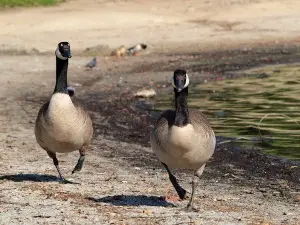
Ducks rely on their legs to both walk and swim, it is clear that legs play a very vital role in a duck’s life. But what if something goes wrong with these bird’s legs and the duck stops being able to walk?
This article looks into why your duck suddenly can’t walk and what to do about it:
Table of Contents
Duck suddenly can’t walk
A duck losing its ability to walk is very concerning, a loss of the ability to walk can very negatively affect your ducks. Here are possible reasons why your bird suddenly can’t walk:
Heat stroke:
Heat stroke isn’t something that only affects humans, this condition can also affect ducks and other animals too. Heat stroke can affect a duck to an extent that it stops walking and rather lays on its side and simply does not walk.
Other symptoms of heat stroke in your ducks include panting, sitting or standing with their eyes closed, holding their wings to the sides of their bodies, droopy wings, and overall distress.
This condition usually develops in ducks over the summertime when it is excessively hot and when the bird has no way of cooling itself down.
What to do:
Heat stroke can be quite a serious condition and it needs to be addressed, if not addressed then the heat stroke can be fatal to your duck.
The first thing that you’d need to do is get the bird out of the hot sun and into some shade to cool off.
You can also give the bird a swimming pool filled with cool clean water to splash around and float in. The bird will also drink this water. Add some ice cubes to the pool to keep it cooler for longer.
The birds will still need to eat, you can feed them chilled, water-dense treats like sliced-up cucumbers, chilled watermelons, peas, blueberries, sliced-up strawberries, and lettuce. These will cool the bird down and refresh it.
Worms:
Worms affect a variety of animals, ducks included. A variety of worms can affect your ducks including caecal worms, roundworms, gizzard worms, gapeworms, and tapeworms.
Signs of a worm infestation in your bird, in addition to the bird not being able to walk and being “off their legs” as some call it, is a shaking of the birds head, underweight ducks, seeing worms in their droppings, coughing, a drop in egg production, quiet ducks, sluggish birds and ducks that look dull overall.
What to do:
If you realize that your duck has worms then you would need to worm (or deworm as some say it) your birds to get rid of these parasites.
Worming the birds twice is recommended, this is because the birds will pick up more eggs from the ground after the first treatment. Worming twice is also recommended if the bird is carrying large amounts of worms.
The second treatment can be done 3 weeks after the first treatment. Products that can be used to worm your birds include Flubenvet, Ivermectin, and Verm-X.
It is recommended that you test your ducks for worms about twice a year, or every three months if you can.
Nutrient imbalance:
A duck’s diet will greatly affect the health of the bird. A lack of vitamin B vitamins, like a lack of biotin (vitamin B12) or niacin (vitamin B3) can cause the bird to go lame.
Fresh feed tends to lack these nutrients so if you’re feeding fresh feed to your bird then this may be why the bird suddenly can’t walk.
The birds may also go lame if there is an imbalance of calcium, phosphorous, or vitamin D in their diet. An imbalance of these vitamins and minerals in the bird’s diet can cause rickets which can cause the bird to lose its ability to walk.
Rickets can cause the bird to develop soft bones which can cause the bird to lose its ability to walk.
What to do:
The feed that you serve your birds likely has these nutrients but some ducks will simply need more of these vitamins and minerals than other ducks.
You can give supplements to birds suffering from a nutrient imbalance. Make sure that you serve these supplements in a different container than the feed. Ducks that need the supplements will eat as much as they need.
Leave this supplement container out all the time for your ducklings.
Also, ensure that you let your ducks out in the sun so that their bodies can produce the vitamin D that they need.
If you enjoyed this article then you may also be interested in other chicken related articles. Here are some articles that you may be interested in: Ducks Beak Is Peeling, Do Duck Bills Shed, How Can You Tell If A Duck Is In Pain

